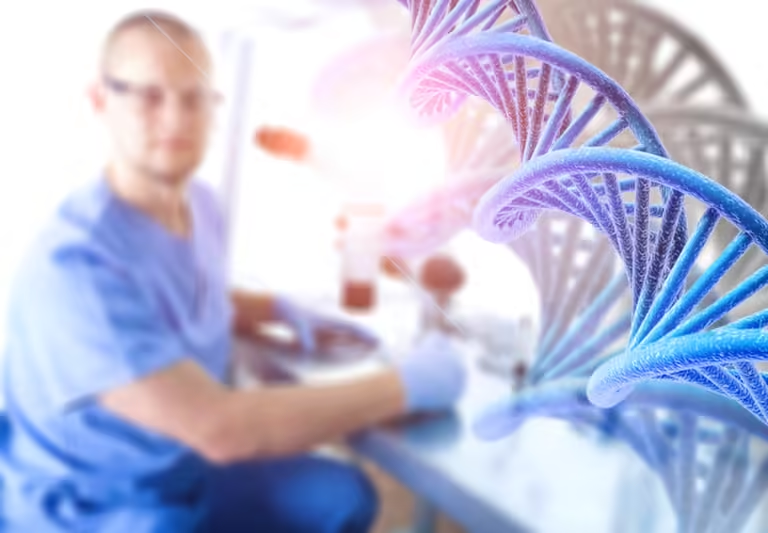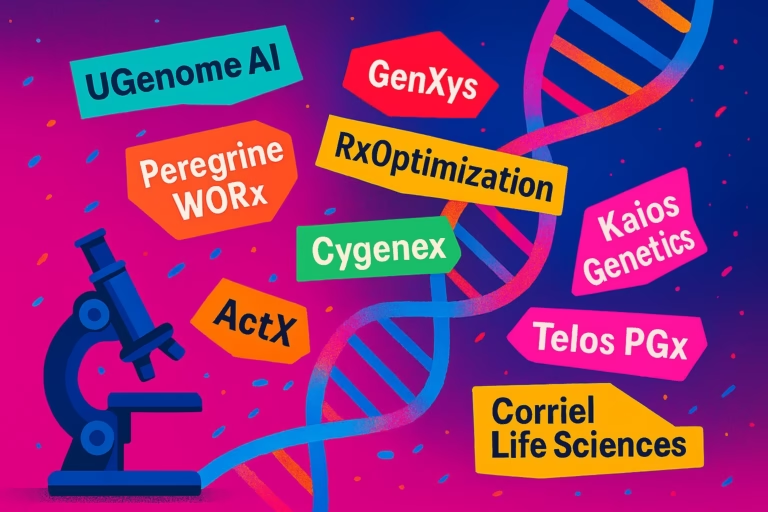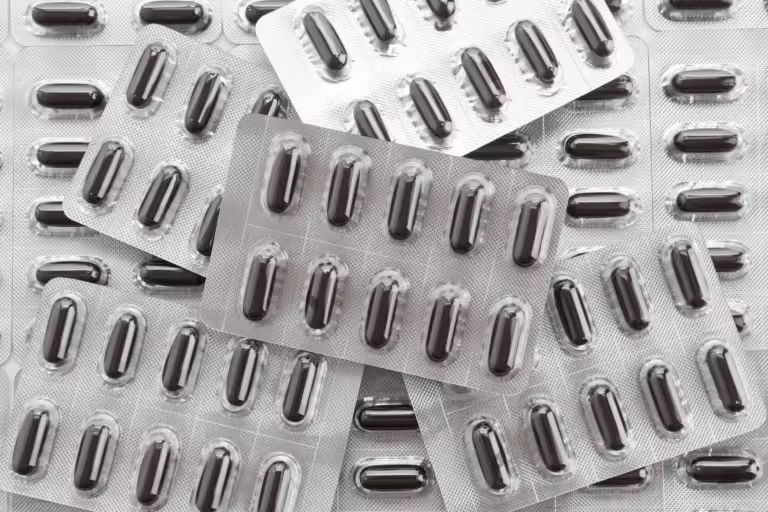Pharmacogenomics is changing medicine, making healthcare more personal. But where is it making the biggest difference? Is it in specific areas or for certain patients?
Research in pharmacogenomics is growing fast. Studies like “The Role of SLC22A1 and Genomic Ancestry on Toxicity during Treatment in Children with Acute Lymphoblastic Leukemia of the Amazon Region” (Fernandes et al., 2022) show how genetics affect treatment. Other studies, like “Impact of Variants in the ATIC and ARID5B Genes on Therapeutic Failure with Imatinib in Patients with Chronic Myeloid Leukemia” (Cereja Pantoja et al., 2022)1, reveal how genetic differences impact treatment success.
Pharmacogenomics isn’t just for cancer. It also helps with conditions like psoriasis, as seen in “Pharmacogenomics: An Update on Biologics and Small-Molecule Drugs in the Treatment of Psoriasis” (Caputo et al., 2021)1. Studies on depression, like “The effect of pharmacogenomic testing on response and remission rates in the acute treatment of major depressive disorder: A meta-analysis” (Rosenblat et al., 2018)1, show how genetics affect treatment outcomes.
Researchers are also looking at how pharmacogenetic testing can save money. For example, “Use of combinatorial pharmacogenomic guidance in treating psychiatric disorders” (Benitez et al., 2018) and “Estimating cost savings of pharmacogenetic testing for depression in real-world clinical settings” (Maciel et al., 2018)1 show its potential.
Pharmacogenomics is all about making drugs safer and more effective. It’s changing treatment plans based on genetics1. From cancer to mental health, it’s leading to a new era of personalized medicine1. Let’s talk about Pharmacogenomics innovation.
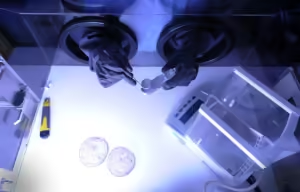
Understanding Pharmacogenomics
Pharmacogenomics is a field that studies how genes affect how we react to drugs2. It aims to make medicine more personal by tailoring treatments to each person’s genes. This field helps make drugs work better, reduces bad reactions, and leads to better healthcare2.
Variability in Human Drug Response
People react differently to drugs, a fact doctors know well2. This difference comes from genes that change how drugs are processed in our bodies2. Genes can make drugs work better or worse, affecting how much we need and the risk of side effects2.
Genetic Factors Influencing Drug Metabolism
Research has found many genes that affect how we respond to medicines2. For example, genes like SLCO1B1 and CYP2D6 play big roles in how drugs are broken down in our bodies2. Knowing these genes helps doctors choose the right drugs and doses, reducing side effects and improving treatment2.
| Gene | Impact on Drug Response |
|---|---|
| SLCO1B1 | Influences statin drug metabolism |
| CYP2D6 | Impacts antidepressant and antipsychotic drug metabolism |
| CYP2C19 | Affects anticoagulant and antiplatelet drug metabolism |
| HER2 | Determines response to certain chemotherapy drugs |
| TPMT | Influences metabolism of immunosuppressant drugs |
Using pharmacogenomics in healthcare helps doctors pick the best drugs and doses for each patient2. This leads to better health outcomes and fewer bad reactions2. It’s a big step towards personalized medicine2.
“Pharmacogenomics has the potential to revolutionize the way we approach drug therapy, moving us closer to the goal of personalized medicine.” –3
Pharmacogenomics is getting better and better, promising safer, more effective, and cheaper drugs2. It’s all about making healthcare more personal and improving patient results2.
Clinical Implementation Consortia
To make pharmacogenomics work in clinics, many groups have come together. The Clinical Pharmacogenetics Implementation Consortium (CPIC) offers pharmacogenetic guidelines for doctors. These guidelines help doctors use genetic tests to improve drug treatments4. The Dutch Pharmacogenetics Working Group (DPWG) also creates pharmacogenetic guidelines for the Netherlands5.
Clinical Pharmacogenetics Implementation Consortium (CPIC)
Since 2011, CPIC has given out many guidelines on using genetic tests in clinics. These guidelines cover many drugs, like thiopurines and warfarin4. CPIC’s work has helped make genetic testing a part of regular care.
Dutch Pharmacogenetics Working Group (DPWG)
The DPWG has also been key in using pharmacogenomics in clinics. Their studies show that using genetic tests can lower bad drug reactions5. They also found that using genetic tests can save up to $3,962 per patient per year5.
| Consortium | Focus | Key Contributions |
|---|---|---|
| Clinical Pharmacogenetics Implementation Consortium (CPIC) | Providing evidence-based, peer-reviewed pharmacogenetic guidelines |
|
| Dutch Pharmacogenetics Working Group (DPWG) | Developing pharmacogenetic guidelines for clinical practice in the Netherlands |
These groups have greatly helped in using pharmacogenomic testing in clinics. They give doctors the tools and knowledge to tailor treatments to each patient’s genetic makeup.
“The work of these consortia has been crucial in bridging the gap between pharmacogenomic research and clinical practice, enabling healthcare providers to harness the power of genetic information to deliver more personalized and effective treatments.”
Pharmacogenomics in Oncology
Pharmacogenomics is changing how we treat cancer. It shows how genetics, like SLC22A1 gene changes and genomic ancestry, affect leukemia treatments6.
Role of SLC22A1 and Genomic Ancestry in Leukemia Treatment
The SLC22A1 gene is key in how drugs work in leukemia treatment. Changes in this gene can change how drugs are absorbed and work, affecting how well they work and their side effects6. Also, a person’s ancestry can affect these changes, making treatment plans more complex6.
Knowing how genetics and treatment interact helps doctors give better care. They can adjust doses and reduce side effects, improving patient results6. This shift in how we treat cancer could lead to more effective and safer treatments6.
“Pharmacogenomics has the power to unlock the individualized approach to oncology, ensuring that each patient receives the right treatment at the right time.”
As pharmacogenomics grows, using this knowledge in treatment plans will be key for better leukemia management7. The future of cancer treatment involves combining genetic analysis, drug development, and tailored treatments. This will lead to better patient results and a more focused approach to cancer care7.
Impact of Genetic Variants on Therapeutic Failure
Research shows that genetic variants can change how drugs work in our bodies8. The term “pharmacogenomics” now means tailoring medicine to each person, not just using one size fits all8. Different genes can make people react differently to the same medicine8.
Genetic differences can affect how our bodies break down drugs8. This is especially true for genes in the CYP family8.
ATIC and ARID5B Genes in Chronic Myeloid Leukemia
Genetic changes can also lead to treatment failure in chronic myeloid leukemia (CML)8. Research has linked certain genes, like ATIC and ARID5B, to not responding well to imatinib8. Knowing these genetic markers can help doctors choose better treatments for CML patients.
Drug reactions can vary a lot between people, leading to bad outcomes8. Pharmacogenomics tries to make drugs work better and safer by looking at our genes8. Using new technologies can help us understand how diseases start and how treatments work8.
How we react to drugs can depend on many things, like our genes and environment8. Pharmacogenomics aims to make medicine cheaper, safer, and more effective8.
“Genetic variants play a significant role in the variability of drug responses among individuals, with pharmacogenomics aiming to leverage this knowledge for personalized medicine and improved treatment outcomes.”
Understanding genetic impact on treatment failure in CML can help doctors give better care8. This is thanks to advances in pharmacogenomics. It promises a future of more effective and tailored healthcare8.
Pharmacogenomics of Cancer Drugs
Pharmacogenomics has greatly changed how we use cancer drugs. It helps us understand how genes affect how drugs work. This way, we can make treatments that work better for each patient, making them safer and more effective.
Genetic changes in cancer cells are key targets for treatment9. Changes passed down from parents can also help cancer grow and resist treatment9. Some genes affect how well drugs work or how safe they are, making treatment options limited for some patients9.
Genetic changes that affect drug response include small changes in DNA and larger changes in gene copies9. Machine learning helps us understand these changes and how they affect treatment9.
Whole Genome Sequencing and Whole Exome Sequencing help find these genetic changes9. These methods are powerful but expensive, with Whole Genome Sequencing covering more but costing more than Whole Exome Sequencing9.
Even though only a few drugs meet their goals in clinical trials, new technologies are changing this9. By using data from many sources and artificial intelligence, we can make treatments that are just right for each patient10.
“Pharmacogenomics has the potential to revolutionize cancer treatment by enabling more precise and personalized therapies that improve patient outcomes and reduce the risk of adverse effects.”
By 2018, the FDA had approved 355 pharmacogenomic biomarkers and 284 drugs for personalized medicine10. Most of these were for cancer, showing how important personalized treatments are10.
Big Data and machine learning are key to making personalized medicine better10. They help us create detailed plans and find new ways to treat cancer10. Technologies like chemical proteomics and Computer-Aided Drug Discovery also help, making research faster and cheaper109.
Pharmacogenomics Innovation in Dermatology
Pharmacogenomics is changing dermatology, especially in treating psoriasis. It shows how genes affect how well drugs work for this chronic skin issue11. Doctors can now pick the best treatments for their patients, leading to better results and fewer side effects.
Biologics and Small Molecules for Psoriasis Treatment
Biologics and small molecules have changed how we treat psoriasis. Research has found genes that affect how these drugs work12. This lets doctors tailor treatments to each patient, making treatments work better and reducing side effects.
New sequencing tech is helping us understand more about genes in pharmacogenomics11. This gives doctors a detailed look at genes that affect how drugs are processed. It helps them choose the best treatments for their patients, improving their lives.
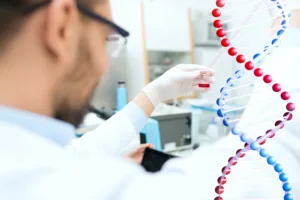
Pharmacogenomics is getting better, and it’s exciting for dermatology. It lets doctors give treatments that are just right for each patient. This is a big step towards a better future in treating skin conditions.
Actionable Genes in Monogenic Diabetes
Pharmacogenomics has greatly helped in understanding monogenic diabetes, a condition caused by a single gene defect. Researchers have found several genes that guide treatment and help manage diabetes more precisely13. Using this information in patient care can improve health outcomes and quality of life.
Monogenic diabetes affects 1-5% of diabetes cases, with types like neonatal diabetes and MODY13. There are 40 known forms of monogenic diabetes13. MODY, the most common, is often caused by mutations in genes like GCK and HNF1A13.
Neonatal diabetes is a rare form that starts early and can be temporary in 50-60% of cases13. Syndromic diabetes is very rare and can be inherited in different ways, often with other health issues13.
Pharmacogenomics has been key in managing neonatal diabetes. Mutations in ABCC8 and KCNJ11 genes affect insulin secretion and can cause different types of diabetes13. Gain-of-function mutations can lead to various diabetes types, while loss-of-function mutations are common in congenital hypoglycemia13.
Sulfonylureas are the best treatment for neonatal diabetes caused by certain mutations13. They help patients switch from insulin to a better treatment option13. In some cases, sulfonylureas can even help with neurological issues13. The success of sulfonylureas depends on the mutation and how long the patient has had diabetes13.
Finding actionable genes in monogenic diabetes has led to better treatment options. By using pharmacogenomics in patient care, doctors can tailor treatments for better results13. This approach improves the lives of patients with monogenic diabetes13.
Tumor-Associated Macrophages and Chemotherapy Resistance
Pharmacogenomics research has shown how tumor-associated macrophages (TAMs) play a big role in making cancer resistant to chemotherapy14. By understanding the genetic and molecular reasons behind this, doctors and researchers can create better treatments. These treatments aim to beat chemotherapy resistance and help cancer patients live better lives14.
Glioblastoma (GB) is a very aggressive brain tumor with a short survival time of about 15 months after treatment15. Macrophages, the most common immune cells in GB, make up to 30% of the tumor15. These macrophages can be either M1 or M2, each with different roles in the tumor15.
M1 macrophages cause chronic inflammation and produce pro-inflammatory cytokines like IL-1β, TNF-α, and IL-615. On the other hand, M2 macrophages help the tumor grow by promoting angiogenesis and tumor progression, with high levels of IL-10 and TGF-β15. Recent studies have found that macrophage activation states are more complex than just M1/M215.
TAMs usually help the tumor grow, invade, and spread15. They can come from blood monocytes or resident macrophages called microglia15. The 2016 WHO classification of CNS tumors includes the tumor microenvironment, including TAMs, as key players in cancer development and progression15.
Thanks to pharmacogenomics research, doctors can now tailor treatments to fight chemotherapy resistance. This can greatly improve the prognosis and quality of life for cancer patients14.
“Understanding the genetic and molecular mechanisms underlying the interaction between tumor-associated macrophages and chemotherapy resistance is crucial for developing more effective, personalized treatment strategies in oncology.”
| Characteristic | M1 Macrophages | M2 Macrophages |
|---|---|---|
| Activation | Classical | Alternative |
| Associated Cytokines | IL-1β, TNF-α, IL-6 | IL-10, TGF-β |
| Function | Chronic inflammation | Tumor promotion, angiogenesis |
Pharmacogenomics: Development and Translation
The journey of16 pharmacogenomics into everyday medicine is complex. It involves finding and testing genetic markers, assessing health technologies, and setting up clinical genomics pipelines. It also requires training healthcare professionals and creating national policies17.
Overcoming these hurdles is key to making16 pharmacogenomics a part of regular care. This will unlock its full potential in precision medicine.
Despite its growing importance16, pharmacogenomics faces many obstacles18. Many people, including pharmacists, feel they don’t know enough about it. Yet, they are open to learning more.
There are mixed feelings about genetic testing. Some worry about discrimination and its impact on personal and family life18. Pharmacists, however, see the value in genetic testing and its cost-effectiveness.
To tackle these issues, everyone involved must work together17. Groups like the CPIC and the DPWG have shown how pharmacogenomics can help patients and save money. By joining forces, we can make personalized medicine a reality faster.
Source Links
- The Future of Pharmacogenomics Requires New Discoveries and Innovative Education – https://www.ncbi.nlm.nih.gov/pmc/articles/PMC9498360/
- Pharmacogenomics – https://my.clevelandclinic.org/health/articles/pharmacogenomics
- Pharmacogenetics: An Important Part of Drug Development with A Focus on Its Application – https://www.ncbi.nlm.nih.gov/pmc/articles/PMC7255432/
- Incorporation of Pharmacogenomics into Routine Clinical Practice: the Clinical Pharmacogenetics Implementation Consortium (CPIC) Guideline Development Process – https://www.ncbi.nlm.nih.gov/pmc/articles/PMC3977533/
- Pharmacogenomics in practice: a review and implementation guide – https://www.ncbi.nlm.nih.gov/pmc/articles/PMC10233068/
- Application of pharmacogenetics in oncology – Biomarker Research – https://biomarkerres.biomedcentral.com/articles/10.1186/s40364-020-00213-4
- Opportunities and challenges of implementing Pharmacogenomics in cancer drug development – https://www.ncbi.nlm.nih.gov/pmc/articles/PMC9019172/
- Pharmacogenomics: A Genetic Approach to Drug Development and Therapy – https://www.mdpi.com/1424-8247/17/7/940
- Frontiers | Machine learning in onco-pharmacogenomics: a path to precision medicine with many challenges – https://www.frontiersin.org/journals/pharmacology/articles/10.3389/fphar.2023.1260276/full
- Review of Personalized Medicine and Pharmacogenomics of Anti-Cancer Compounds and Natural Products – https://www.mdpi.com/2073-4425/15/4/468
- Deciphering next-generation pharmacogenomics: an information technology perspective – https://www.ncbi.nlm.nih.gov/pmc/articles/PMC4118603/
- Pharmacogenomic technologies: a necessary “luxury” for better global public health? – https://www.ncbi.nlm.nih.gov/pmc/articles/PMC3175439/
- Role of Actionable Genes in Pursuing a True Approach of Precision Medicine in Monogenic Diabetes – https://www.mdpi.com/2073-4425/13/1/117
- Drug resistance and combating drug resistance in cancer – https://www.ncbi.nlm.nih.gov/pmc/articles/PMC8315569/
- Frontiers | Targeting Tumor Associated Macrophages to Overcome Conventional Treatment Resistance in Glioblastoma – https://www.frontiersin.org/journals/pharmacology/articles/10.3389/fphar.2020.00368/full
- The role of pharmacogenetics and pharmacogenomics in improving translational medicine – https://www.ncbi.nlm.nih.gov/pmc/articles/PMC2781217/
- Translating pharmacogenomics into clinical decisions: do not let the perfect be the enemy of the good – Human Genomics – https://humgenomics.biomedcentral.com/articles/10.1186/s40246-019-0229-z
- Development of the pharmacogenomics and genomics literacy framework for pharmacists – Human Genomics – https://humgenomics.biomedcentral.com/articles/10.1186/s40246-021-00361-0
